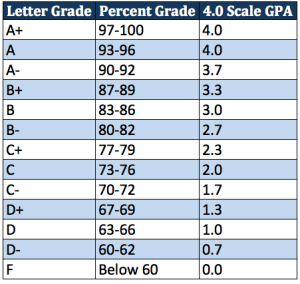
Summer is just around the corner and everyone seems to be getting ready for their internships. If for some reason or another you aren’t taking that path this summer, it’s completely fine. There are a bunch of things you can do over the next couple of months that will help build your resume for the next internship and job-hunting season.
Here are 5 of the best things you can do to for your resume this summer:
Volunteer
Volunteering is a great way to spend your summer. Employers love to see people who have taken the time to give back to their communities; it shows selflessness and initiative, as well as a capacity to work well with others and contribute in a group environment. It also alludes to your ability to make the office-community a friendlier and more cooperative place of work, something all companies want.
Best of all, you can pretty much choose any cause you want to devote your time to and it’ll look good. Things like animal shelters, soup kitchens, elderly homes, and little league are all great. Plus you’ll actually be helping your community while beefing up your resume, so it’s a win-win for everyone.
It’s also a great opportunity to develop new soft skills such as leadership, communication, problem-solving, and conflict resolution. Those words look great on a resume, and they can be acquired and honed in through your role as a volunteer. You’ll also acquire experiences you can talk about in an interview setting, and demonstrate your value through those stories.
However, if you are going to volunteer, it’s important to not only look for roles in causes you’re passionate about, but also where you’ll be able to acquire those skills. It’s painfully obvious when someone does something just to put it on their resume, and a disingenuous attempt at a summer volunteer job will be an easy catch. Most places are looking for volunteers anyway, might as well choose the ones that will give your resume some real added value.
Learn A Hard-Skill
The “skills” section of your resume can make or break an offer. Bosses want their employees to have at least the basic skills necessary to perform a job before they agree to bring them onboard, and this is especially true of online-tool literacy. Being able to put “expert” on a tool or program (and mean it), or better yet have a certificate demonstrating your mastery of it, can go a very long way.
So if for example your area of interest is business, a certificate in an excel course from a community college or reputable online website is huge. The same goes for designers and photoshop, mathematicians and matlab, and filmmakers and Premiere pro. Having the basics of these programs down will give you a leg up when it comes to applying for jobs that use them on a daily basis. It’s one less thing they would have to teach, and therefore one more reason to hire you.
There are a number of free and pay websites dedicated to providing online courses for students, many of whom also give certificates of completion. Codecademy is great for those who want to sharpen their coding and web-development skills, GCF is for learning excel and other online tools, and Khan Academy covers a wide range of concepts from math and finance, to the arts & humanities. Take advantage of these tools, and you’ll be in a much better position for future job openings.
Work – Don’t Intern
You don’t have to have an internship to “work” during summer. A part-time job is a great alternative to slap on a resume because it demonstrates drive and willingness take on responsibility. The extra cash can come in handy during the summer weekends too. Also, if you have a good relationship with your boss, you have a solid referral for when the next job opportunity comes around.
Also, similar to a volunteering position, you can acquire skills and experiences that will help build up your resume. The good thing about an actual job though, besides the getting paid of course, is that you can gain experience in real job-related fields such as sales, customer-service, management assistance, etc. Your experience in these can help differentiate you from others who haven’t had the the same exposure to real work in those areas.
Another option is to work on your own projects. This one is tough because it requires a lot of self-motivation and discipline on your part, but if something meaningful and material does come of it, it can prove a very attractive point on a resume. It also allows you to be your own boss, and put your energy towards something you’re interested in.
Finally, eligible students may not know that they can get work-study while taking classes during the summer. In general, schools determine who is eligible for work study based on your completed FAFSA application, contact your school to if out if your work study program extends into summer sessions to see if this is an opportunity for you.
Network
“It’s not what you know, it’s who you know”, we’ve all rolled our eyes at that one before. You can’t put the names of who you know on a resume, and most of the best places to work have strict merit-based hiring policies where favoritism is actively blocked- that’s part of what makes them the best. So how can networking help your resume?
A solid network (i.e. knowing the right people) is a fundamental part of a successful career. The important thing though is to approach it from a mentality of “who will help me be successful at my next job”, rather than “who can get me my next job”. If you’re successful in your role, your bosses will by default share in that success. That’s why besides looking for people with the right skills and experience, they will often seek out those who have the connections and knowledge of industry players to do their jobs well.
There are various ways to show you “know the right people” on your resume. One is to join an industry networking club or non-profit. Some fields will be more prone to this kind of planned, constructed, centralized networking. They usually operate through topic-specific events which are attended by people with different levels of seniority from many companies. If you say you’re part of that “club” it’ll imply that you have some connections in the industry you can speak of. Another way is to become involved in the alumni association of your school. It may not be industry specific, but again it implies you have relationships with professionals. The key to this is that it starts the conversation about networking, so that even if you haven’t met anyone of note at events, you can slide those who are worth mentioning into the conversation without making it too obvious you’re flexing those relationships.
Become An Expert In An Unrelated Topic
A resumes’ main objective is to show that your skills and experience match what the job requires, but it should also illuminate who you are as a person and whether you fit the company culture or not. This is where the “interests and activities” portion of your cv comes into play, and where learning about an unrelated topic can help you advance through the job market.
Employers want to see applicants who are motivated and “hungry” in their work, but also in other aspects of life as well. Most entry-level jobs come with a steep learning curve, and a person who is curious and diligent about their interests will probably be better able to apply those qualities to the challenges of a new job. Even more, an interesting topic on your resume allows you to demonstrate your knowledge on a subject in which you’re articulate. In other words, it gives you the opportunity to look smart.
There are plenty of articles, books, and documentaries you can learn from to get better acquainted with a topic of interest. If you want to bump it up a notch though, MIT and Stanford each have their own catalog of free courses that are actually taught at those universities. There are sites like Coursera and edX which offer courses from many schools too. These will give you high-quality college level understanding of a topic, all planned out, easily accessible, and mostly for free. It’s a great platform through which you can be productive and build your resume in the process.
At the end of the day what your resume will really do is provide talking points you can elaborate on for an employer. As long as those points are relevant, interesting, and make you look good, they’re worth your time. The key though is to be able to demonstrate how they have prepared you for the job you’re applying for. Whether it’s developing your soft or hard skills, volunteering, learning new things, working, or just being productive with your time- your resume should reflect a well-rounded person, and that means working hard during the summer even when you don’t have an internship.


